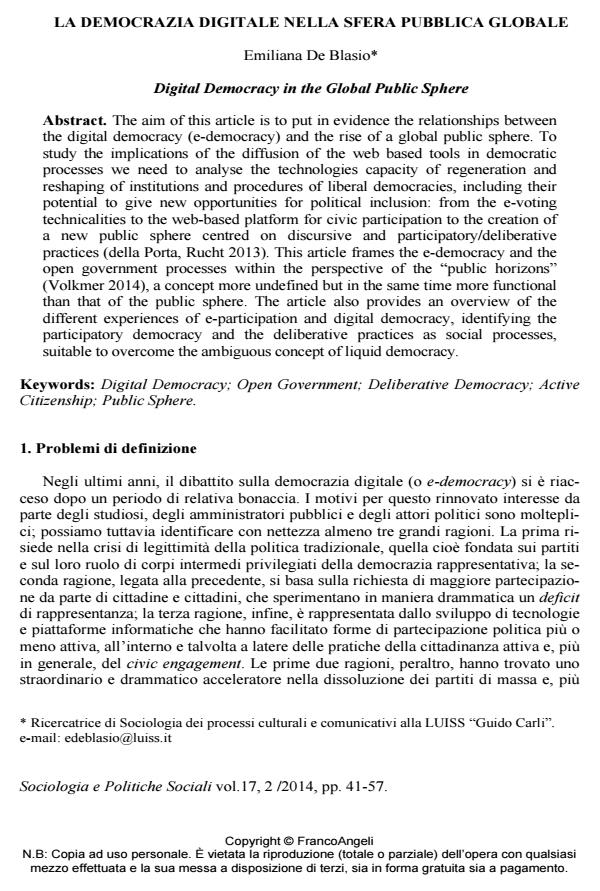La democrazia digitale nella sfera pubblica globale
Titolo Rivista SOCIOLOGIA E POLITICHE SOCIALI
Autori/Curatori Emiliana De Blasio
Anno di pubblicazione 2014 Fascicolo 2014/2
Lingua Italiano Numero pagine 17 P. 41-57 Dimensione file 138 KB
DOI 10.3280/SP2014-002003
Il DOI è il codice a barre della proprietà intellettuale: per saperne di più
clicca qui
Qui sotto puoi vedere in anteprima la prima pagina di questo articolo.
Se questo articolo ti interessa, lo puoi acquistare (e scaricare in formato pdf) seguendo le facili indicazioni per acquistare il download credit. Acquista Download Credits per scaricare questo Articolo in formato PDF

FrancoAngeli è membro della Publishers International Linking Association, Inc (PILA), associazione indipendente e non profit per facilitare (attraverso i servizi tecnologici implementati da CrossRef.org) l’accesso degli studiosi ai contenuti digitali nelle pubblicazioni professionali e scientifiche.
The aim of this article is to put in evidence the relationships between the digital democracy (e-democracy) and the rise of a global public sphere. To study the implications of the diffusion of the web based tools in democratic processes we need to analyse the technologies capacity of regeneration and reshaping of institutions and procedures of liberal democracies, including their potential to give new opportunities for political inclusion: from the e-voting technicalities to the web-based platform for civic participation to the creation of a new public sphere centred on discursive and participatory/deliberative practices (della Porta, Rucht 2013). This article frames the e-democracy and the open government processes within the perspective of the "public horizons" (Volkmer 2014), a concept more undefined but in the same time more functional than that of the public sphere. The article also provides an overview of the different experiences of e-participation and digital democracy, identifying the participatory democracy and the deliberative practices as social processes, suitable to overcome the ambiguous concept of liquid democracy.
Parole chiave:Digital Democracy; Open Government; Deliberative Democracy; Active Citizenship; Public Sphere.
Emiliana De Blasio, La democrazia digitale nella sfera pubblica globale in "SOCIOLOGIA E POLITICHE SOCIALI" 2/2014, pp 41-57, DOI: 10.3280/SP2014-002003